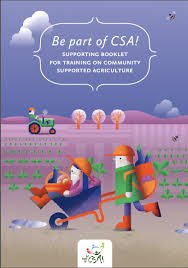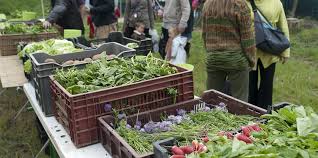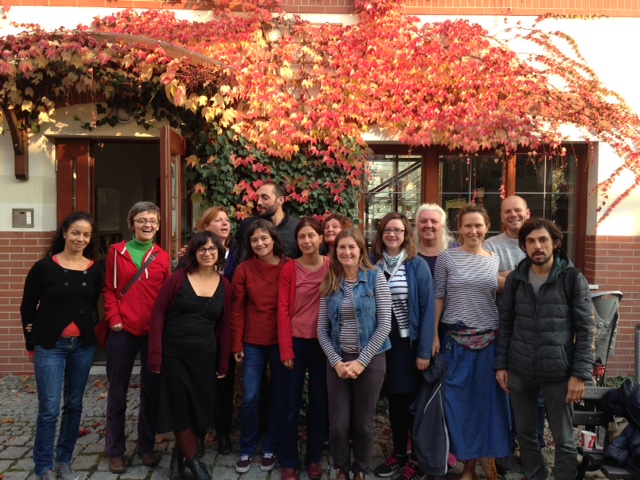On October 18-20, 2017, 16 partners from the CSAct! Erasmus+ project gathered at EkoCentrum Wrocław, hosted by our Polish partners from Fundacja EkoRozwoju (FER). The main objectives of the Kick-off meeting was to make clearer to everyone about theCSAct! objectives and activities to be developed during the next 24 months and to get organized in order to implement this ambitious educational programme for Community-Supported Agriculture in Europe.
Indeed, CSAct! “the CSA collaborative training programme” is meant to develop in Greece, Italy, Poland and Spain, thanks to Urgenci’s expertise and mentoring from TVE (Hungary, coordinator of the Be part of CSA! project) several activities:
- Improve the modular core CSA training programme:
 One the main focuses of our project is to extend the „Be part of CSA!“ European training programme to new European countries in which there is no comprehensive educational programme related to Community-Supported Agriculture yet. The „Be part of CSA!“ is an innovative European non-formal training program composed of 4 modules. Through dissemination activities the training programme became a reference within the European and International CSA movement. Deafal, COAG, AgroEcopolis and FER expressed their interest in carrying out the educational programme in their countries. After the needs assessment in each partner country, it turned out that the core content and the methodology of the „Be part of CSA!“ training programme meet with the expectations of the target group. However, it became also evident that because of the different background and development levels of the national CSA networks, the success of the project could be ensured only with intense differentiation efforts.
One the main focuses of our project is to extend the „Be part of CSA!“ European training programme to new European countries in which there is no comprehensive educational programme related to Community-Supported Agriculture yet. The „Be part of CSA!“ is an innovative European non-formal training program composed of 4 modules. Through dissemination activities the training programme became a reference within the European and International CSA movement. Deafal, COAG, AgroEcopolis and FER expressed their interest in carrying out the educational programme in their countries. After the needs assessment in each partner country, it turned out that the core content and the methodology of the „Be part of CSA!“ training programme meet with the expectations of the target group. However, it became also evident that because of the different background and development levels of the national CSA networks, the success of the project could be ensured only with intense differentiation efforts.
Thus, within the CSAct! project, the already existing training programme will not only be taken over in Italy, Spain, Greece and Poland, but will furthermore be improved and completed with new activities based on the needs of adult learners. The extended educational programme will be tested and disseminated in 4 European countries (Italy, Spain, Greece and Poland) during multiplier events.
- Create a “Module 5 “on CSA Economic sustainability – Basics for sound CSA farms and groups.
During the project period we will provide new content and method for the European core training program about CSA and extend the offer according to the new needs that have been collected in 2016-2017. One of them, essential, insist on the economic sustainability of CSA farms and groups (new module 5).
Indeed, CSAs are similar to small-scale farm businesses, but a really important characteristics of these initiatives is that their operation is based on a community financing model. Consumers join to one or more small-scale farm and pay upfront (usually for a season) a fair price for the produced food. In order to reduce liability risk and ensure the long-term financial sustainability of these social businesses, innovative methods and creative financial arrangements are needed which requires a special knowledge and experience. There are many options depending on your business/community model.
The long-term financial sustainability of these initiatives strongly depends on community management, communication and transparent operation. Farmers and coordinators often does not have enough knowledge and experience on these fields.
- Work on a Farmer-to-Farmer Extension, with a “CSA farmer booklet”.
Repeatedly, farm ers gather during the CSA meetings and self-organise into « farmer-to-farmer » workshops. A specific talk was held during the 3rd European CSA meeting in Ostrava (CZ) in September 2016. The main practical questions that came up were: How to upgrade mutual support and synergies with other CSAs? How to efficiently organise communication, advertising, and the relationship to the customers? How to make a living out of a CSA farm? Some solutions to these challenges have been identified: including consumers to the scheme from the very beginning will guarantee solid support to the farmer all along the relationship; improving cooperation between producers will help combine skills and overcome some obstacles.
ers gather during the CSA meetings and self-organise into « farmer-to-farmer » workshops. A specific talk was held during the 3rd European CSA meeting in Ostrava (CZ) in September 2016. The main practical questions that came up were: How to upgrade mutual support and synergies with other CSAs? How to efficiently organise communication, advertising, and the relationship to the customers? How to make a living out of a CSA farm? Some solutions to these challenges have been identified: including consumers to the scheme from the very beginning will guarantee solid support to the farmer all along the relationship; improving cooperation between producers will help combine skills and overcome some obstacles.
If the “Be part of CSA!” -core programme insists on training farmers and consumers together in order to build a solid community, smallholders agreed that it should include an educational section devoted to CSA farmers. Therefore, partners drafted a “farmer-focused” questionnaire in each partner country (Greece, Italy, Hungary, Spain, Poland) to get a better insight to help us design a “CSA Farmer-to-farmer extension” in our training endeavours. The main suggested topics are:
- Production challenges & farming techniques- with special care for crop planning and different ways to improve soil fertility;
- Balancing income and expenses: what’s a fair share?
- Diversified marketing, logistics & distribution
- Building a community of members: How to get committed members to support the farmers so they can have more time to focus their energies and skills on producing high-quality food, caring for their farmland, and caring for themselves
- Develop a “Strategy for CSA Knowledge transfer”, accompanied with a toolkit.
The CSA Knowledge Transfer Toolkit is an educational guide which supports trainers of the partner organisations, but also ensures the long-term sustainability of the project. Indeed, it is designed to be used in the case of future developments of the CSAct! educational programme.It will provide methodological support for trainers who will facilitate test training events during the project and carry out the CSAct! training programme.
Its design will be a participatory learning process, providing a hands-on learning opportunity for all partners who participate. By the end, participating trainer-facilitators will be able to design a training session and will be ready to facilitate the test training events with the project’s target groups.
- Implement a digital learning strategy for CSA.
 The digital Learning Strategy addresses the need for distant training as well as for a pooling of educational materials. The history of CSA is a typical example of the ongoing cross-border diffusion of concepts and practices. As stated in the European Declaration on CSA adopted in Ostrava, 17th of September 2016, the CSA stakeholders want to systematise this capacity-building and learning process : they want « to build a strong coalition of CSA and CSA networks across Europe to strengthen the CSA movement and help new CSAs to flourish, (and to) enable sharing of knowledge and skills between CSAs in different countries. »
The digital Learning Strategy addresses the need for distant training as well as for a pooling of educational materials. The history of CSA is a typical example of the ongoing cross-border diffusion of concepts and practices. As stated in the European Declaration on CSA adopted in Ostrava, 17th of September 2016, the CSA stakeholders want to systematise this capacity-building and learning process : they want « to build a strong coalition of CSA and CSA networks across Europe to strengthen the CSA movement and help new CSAs to flourish, (and to) enable sharing of knowledge and skills between CSAs in different countries. »
Digital technologies can provide a useful support to extend knowledge and skill -sharing beyond physical training. Their contribution can be twofold : on the one hand, they can offer CSA stakeholders, wherever they are located, the possibility to benefit from training and mentorship programmes; on the other hand, they can offer easier access to existing training materials.
- E-Training for CSA stakeholders through the Mentor Moocs and the Mentorship Directory
- Pooling Educational materials for CSA
The idea is to organise a Resource Centre, a digital platform on Training on CSA, where available CSA training materials from all Europe (and even from outside Europe) would be collected, with an easy access to.


